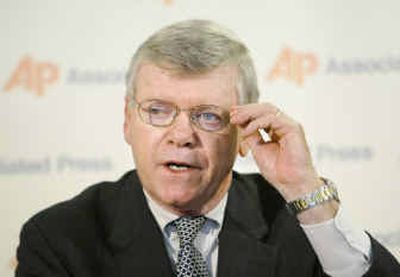FDA nomination on hold over Plan B

WASHINGTON – The nomination of Lester Crawford to be commissioner of the Food and Drug Administration was put on indefinite hold Wednesday by two Democratic senators to protest the administration’s long delay in deciding whether to allow non-prescription sales of the emergency contraceptive Plan B.
Sen. Patty Murray, D-Wash., announced the hold after a 30-minute meeting with Crawford Tuesday, which she said ended without a commitment by Crawford regarding when the Plan B issue might be resolved. Murray said Sen. Hillary Rodham Clinton, D-N.Y., had joined her in blocking a vote on the confirmation until the FDA acts.
Murray said the administration appeared to be making a “political and ideological decision” regarding Plan B, and “there is no scientific reason for this approval to not go forward.” She said that the credibility of the FDA as a science-based agency “is on the line.”
Crawford, currently the FDA’s acting commissioner, left the meeting in Murray’s office without comment. Clinton and Sen. Edward Kennedy, D-Mass., also attended the meeting.
Emergency contraception was approved by the FDA in 1999 as a prescription-only drug. Its manufacturer, Barr Laboratories, applied for approval to sell Plan B without prescription in April 2003, and an agency advisory panel voted 23-4 to support the application later that year.
The FDA’s scientific staff also strongly recommended approval.
The acting director of the FDA’s Center for Drug Evaluation and Research, Steven Galson, surprised many by rejecting the application last May. A revised application was supposed to be decided by the FDA in January, but it has taken no action.
The question of whether emergency contraception should be available without a prescription has become a contentious one – with social conservatives arguing it will encourage young women to be promiscuous, while advocates of wider use say it will prevent pregnancies that could result in abortions.
If taken within 72 hours of unprotected sex, Plan B works like a contraceptive and prevents ovulation, fertilization or implanting of a fertilized egg. The most generally accepted definition of when life begins is when a fertilized egg is implanted in the uterus, but some religious conservatives believe it happens when the egg is fertilized and consider emergency contraception a form of abortion. Most medical professionals do not.
During his confirmation hearing, Crawford appeared to say that the Plan B application would ultimately be approved, but Murray said Crawford was unclear Tuesday on that question. She said that the FDA voiced two remaining concerns – that the easier availability would affect the behavior of young women and that a lawsuit filed by advocates of Plan B against the FDA in January had made the review more complicated.
That lawsuit focuses on how the drug would be sold. The advocates want Plan B to be available on pharmacy shelves, while Barr Laboratories – in its second submission – proposed that it be sold from behind-the-counter and available only from a pharmacist.
After the meeting, Clinton said that “the FDA has had the Plan B application for years, and the American people simply need an answer, yes or no. Science should never take a back seat to politics and ideology.”